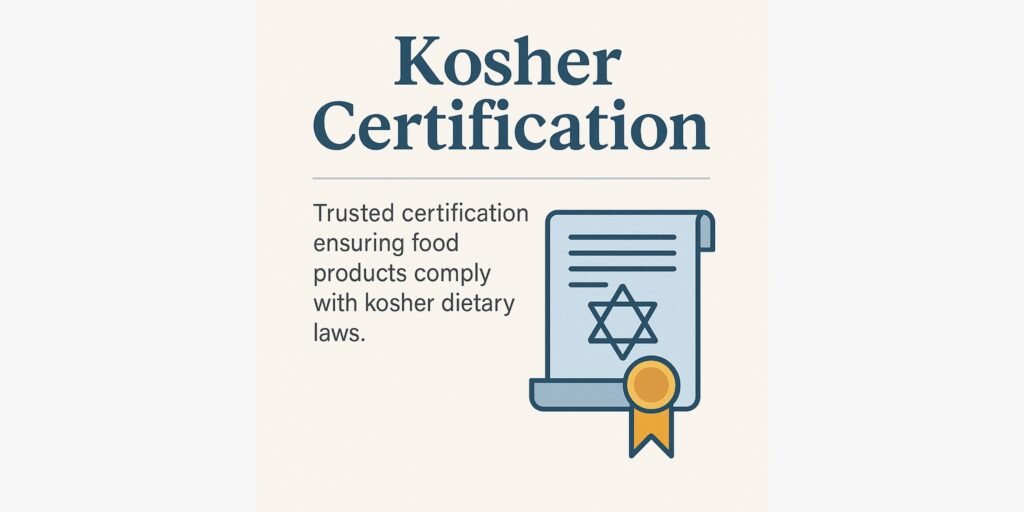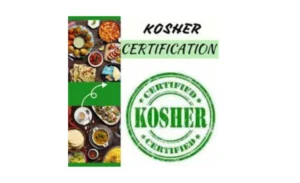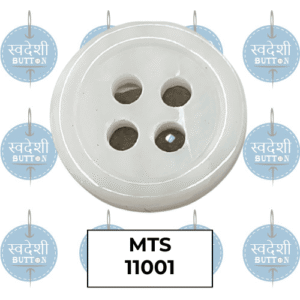Kosher Certification: What It Means and Why It’s Important

Globally Acceptable Kosher Certificate
If you’ve ever walked down a grocery aisle and paused to read the labels on packaged foods, you’ve probably noticed the word “Kosher” on some products. But have you ever wondered what Kosher certification actually means? Why do some companies go out of their way to get this certification? And why do so many customers — even those who don’t practice Jewish dietary laws — look for this symbol? Let’s take a deeper dive into Kosher certification and see what it involves.
What Exactly Is Kosher Certification?
Kosher certification is an official process that confirms a food or beverage meets the guidelines of kashrut, the Jewish dietary laws. Kashrut is an ancient set of rules that outlines what kinds of food can be eaten and how those foods must be handled and prepared. The word “Kosher” itself means “fit” or “proper.” So, when a product carries a Kosher-certified label, it indicates that someone qualified has verified that every part of its production — from raw ingredients to final packaging — is in line with those guidelines.
Kosher certification is not just about tradition. It’s about careful supervision, food safety, and attention to every detail. This careful monitoring is one of the main reasons Kosher-certified foods appeal to a broad audience, including people who don’t necessarily keep kosher for religious reasons.
Why Do Companies Get Kosher Certification?
Increasingly, companies are opting for Kosher certification because it enables them to tap into a larger and more diverse customer base. Sure, Kosher certification is a must for people who follow strict Jewish dietary laws. But millions of consumers trust Kosher-certified products simply because they believe the food is held to higher standards of cleanliness and safety.
In today’s global marketplace, many companies recognize that this certification is a real advantage. Big grocery chains, online marketplaces, and even specialty food shops often prefer to stock Kosher products. This means that companies with Kosher certification can sell more products, attract more loyal customers, and reach entirely new markets.
Additionally, having a Kosher certification can enhance a company’s reputation. It signals to customers that the company cares about transparency, quality, and integrity — qualities that every buyer appreciates.
What’s Involved in Getting Kosher Certified?
At first, the process of obtaining Kosher certification may sound complex, but in practice, it’s straightforward and transparent. Here’s a closer look at the typical process:
1. Application and Ingredient Review
First, a company must apply to a recognized Kosher certification agency. Every ingredient, additive, and processing aid — even those that never appear on the label — must be declared and reviewed. The agency checks each one carefully to ensure it meets Kosher requirements.
2. Facility Inspection
Next, a trained Kosher supervisor, sometimes called a mashgiach, visits the company’s facility. They examine every part of the production process, from where raw materials are stored to the machines that process the food. They want to make sure that Kosher foods never come into contact with non-kosher items.
3. Implementation of Changes
If the supervisor spots any conflicts — for example, if some equipment is used for both Kosher and non-Kosher items — they will suggest solutions. Companies may need to clean machines in a specific way or set aside designated tools for Kosher products only. The process is cooperative and practical.
4. Agreement and Certification
Once all requirements are met, the company signs a formal agreement with the Kosher certification agency. After that, they receive an official Kosher certificate. This allows them to place the recognizable Kosher symbol on their product labels and packaging.
5. Ongoing Compliance
Kosher certification is not a one-time event. Agencies conduct periodic follow-up visits and checks to ensure that standards continue to be met. This ongoing supervision is what gives Kosher certification its credibility and trust.
Why Do Consumers Trust Kosher Products?
Consumers appreciate Kosher-certified foods because they know that someone carefully monitored every stage of the process. Even people who do not follow Kosher dietary laws often choose Kosher products because they recognize the commitment to cleanliness, safety, and quality control. The certification ensures that every Kosher-certified product has been thoroughly checked, from the raw materials to the final product on the shelf.
People with food sensitivities, like those avoiding dairy or meat, also look for Kosher labels. Kosher foods must indicate whether they’re dairy, meat, or pareve (neutral), so customers can quickly make informed decisions that fit their dietary needs.
Kosher Certification Beyond Food
While Kosher certification is most common in the food industry, its reach goes further. Many people are surprised to discover that cosmetics, supplements, vitamins, personal care items, and even some pet foods can be Kosher-certified too. The Kosher seal on these products shows consumers that they have been checked to a strict standard of safety and cleanliness.
Conclusion
In the end, Kosher certification is much more than a religious practice — it’s a recognized mark of care, safety, and quality. Companies that go through this process show customers they take their products seriously and want to do things the right way. And for consumers, seeing that a Kosher label is like having an extra layer of assurance that the product they’re buying has been made carefully, responsibly, and with respect for strict standards.



